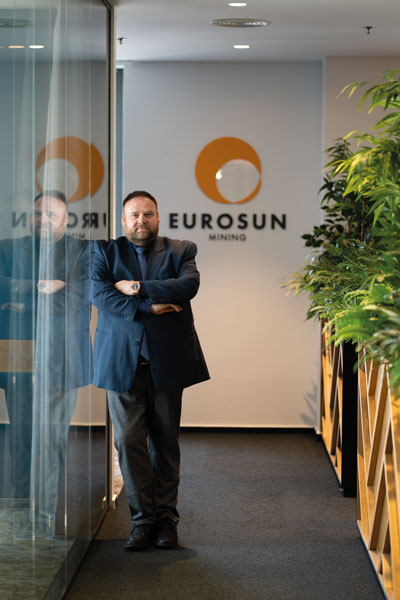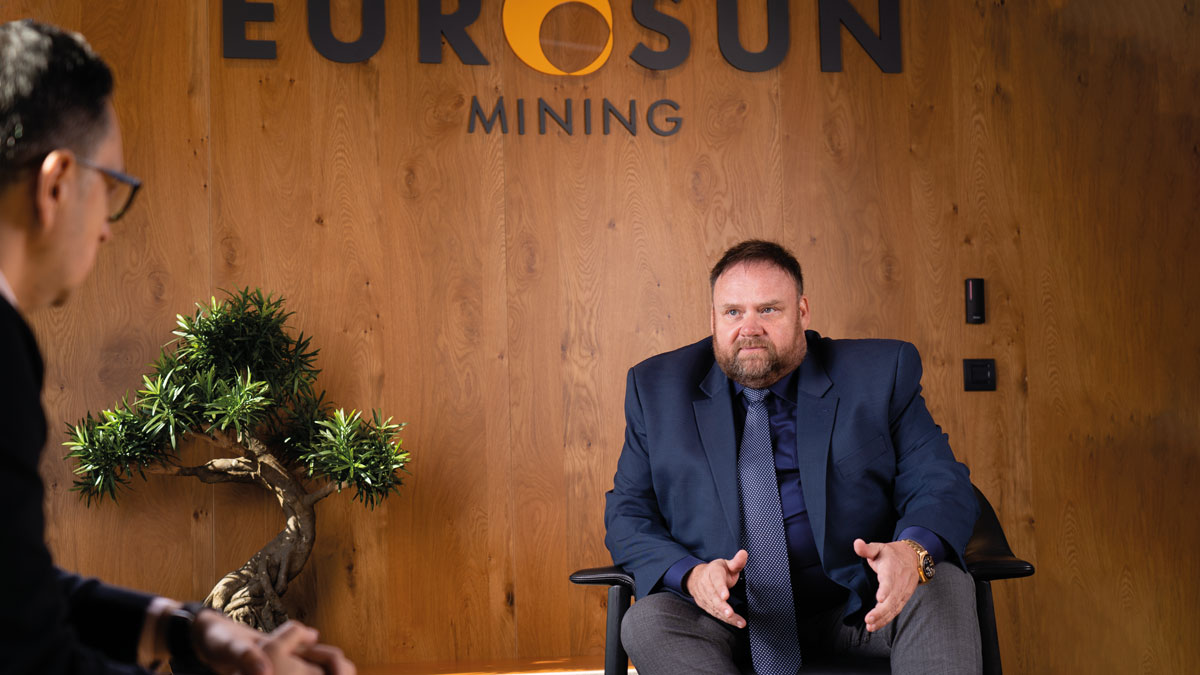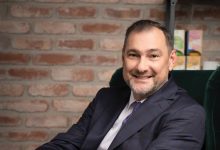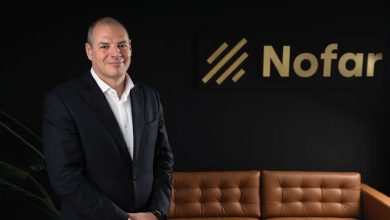Scott Moore, CEO Euro Sun Mining: Rovina Valley Project Heads for First Production in 2024
Euro Sun is a Toronto Stock Exchange listed mining company focused on the exploration and development of its 100%-owned Rovina Valley gold and copper project located in west-central Romania, which hosts the second largest gold deposit in Europe and 14th largest undeveloped gold deposit in the world.
In May this year Euro Sun received approval to initiate Strategic Environmental Assessment for the project. Currently, the company and the Environmental Protection Agency of Hunedoara County are preparing for public consultations which are expected to occur in Q3 2021.
Scott Moore, CEO Euro Sun Mining, unveils the development plans, progress, and future priorities for the Rovina Valley Project in Romania.
Scott Moore is a business executive with over 30 years of experience in the resource and durable goods sectors. He is the former President and CEO of Dacha Strategic Metals, former Director of Avion Gold and former EVP of Sulliden Gold. Scott Moore holds a Bachelor of Arts degree from the University of Toronto and an MBA from the Kellogg School of Management. Presently he is the CEO of Euro Sun Mining.
Dear Mr. Moore, first of all, how did your activity start in Romania?
Scott Moore: The predecessor company to Euro Sun Mining (ESM) was called Carpathian Gold and made the discovery of the Rovina Valley Project in 2004.
I took over management of ESM in 2016 after previous management was unsuccessful in building a new mine in Brazil.
What are the main data and coordinates of the Rovina Valley project? What is the potential of this project in terms of resources?
Scott Moore: Rovina is located in Hunedoara County, approximately 35 kilometers north of Deva and just outside the City of Brad, home to the past producing Barza mine so the area has a long history and familiarity with mining.
Rovina currently has measured and indicated resources of approximately 7 million ounces of gold and 1.4 billion lbs of copper in three separate ore bodies.

How are Environmental, Social and Governance (ESG) principles integrated into this business?
Scott Moore: ESG principles are the key driving factors for the company as without these we would not be successful moving towards operating the mine.
Euro Sun is aligned with the United Nations Sustainable Development Goals to build and operate the most environmentally responsible new mine in Europe.
Environmentally we are using dry-stack tailings not wet tailings so there is no opportunity for dam failures using this method.
Additionally, we re-cycle 95% of process water compared to 30% for a similar operation using wet tails.
We use zero cyanide in the processing operations and the project will be re-habilitated during the operation of the mine thereby minimizing the impact to the environment.
Socially we are part of the community since 2004 and have a policy of openness and transparency for all our affected stakeholders.
Governance is also key to our success.
Like I said earlier, Euro Sun is aligned with the United Nations Sustainable Development Goals to build and operate the most environmentally responsible new mine in Europe. The Company aligns with the UN goals 5, 8, 9, 10,12,13 and 15 to achieve Social Inclusion, Economic Development and Responsible Operations.
Euro Sun received approval to initiate Strategic Environmental Assessment for the project. How important this step is for the company? What comes next?
Scott Moore: The Strategic Environmental Assessment is essentially the environmental opinion on our Planul Urbanistic Zonal or PUZ. It is a major step in the process following the approval of the Avizul de Oportunitate for the project.
Along with the submission of our PUZ we expect public consultations in September this year. The next major step will be the submission of our Environmental Impact Assessment later this year with the Ministry of Environment.
Often, major development projects do not deliver tangible benefits to local residents. What will be the impact of the Rovina Valley Project for the communities throughout the county of Hunedoara?
Scott Moore: Euro Sun will have a meaningful economic impact to all our local residents.
We will employ directly approximately 500 full time employees and generate likely over 1000 indirect jobs to support the project.
During construction we would likely employee 2000 people to build the project. Additionally, we estimate over US$500 million in royalties and corporate taxes paid to the state over the life of the mine with a large percentage of the royalty going back to the affected local communities and the county.
With a mine life already approaching twenty years, Euro Sun will be a meaningful economic contributor to Hunedoara County for decades.
According to the International Energy Agency, the world won’t be able to tackle the climate crisis unless there is a sharp increase in the supply of metals required to produce electric cars, solar panels, wind turbines and other clean energy technologies. How do you assess the current situation on the electric metals market in Europe and worldwide and what are your expectation from this project in this context?
Scott Moore: De-carbonization of the economy means copper.
All clean technologies rely on copper and the European Union needs to ensure access to this critical metal.
Copper mines require huge investments in order to build or expand and the supply side response to the new demand for copper in electric cars, charging stations, wind turbines can take decades to meet.
Copper from the European Union to the European Union is one of the key goals for Euro Sun.
The only product produced at Rovina is a clean copper concentrate containing gold; no gold bars are being poured on site and we fully intend to deliver our concentrate to smelters within Europe.
Meeting the goals of the Paris climate agreement will require a significant increase in clean energy. Reaching net zero emissions by 2050 would require even more investment. What are your plans and sources of investment in this regard?
Scott Moore: Our project is already designed to optimize our carbon footprint by utilizing electric conveyors versus trucks in moving the majority of material in Rovina. As we tap into the Romanian national grid, we are mainly utilizing clean power such as hydroelectricity for our project and when available would migrate to an all-electric fleet to further reduce our site emissions. As you know in Romania, we are required to replace three times the amount of forests removed during operations and in reality we will re-forest the project during production ultimately adding 300 percent more forests than current on the Rovina Valley Project.
As countries switch to green energy, demand for copper, lithium, nickel, cobalt, and rare earth elements is soaring. All these are yet vulnerable to price volatility and shortages. Also, mining companies face stricter environmental and social standards. How do you manage to overcome these challenges?
Scott Moore: Definitely social and environmental opposition to mining in general is high globally yet the push for De-Carbonization will require more mines.
You can’t have one without the other. Hence our industry has to move into technologies and practices that limit the environmental and social impacts and think of the life cycle of the project from the beginning.
We have seen opposition in Romania to mining driven around potential environmental legacies such as wet tailings or using cyanide.
At Rovina we have adopted dry stack tails which recycle 95% of the process water used, we do not use cyanide; our two proposed open pits will be completely re-habilitated during the mine life with one pit fully backfilled and re-forested and the second becoming a new clean lake for the enjoyment of the local communities.
The waste areas will also be fully re-forested as well in addition to the process plant location. This cradle to grave mentally is necessary for all stakeholders to benefit.
Could you give us some more details on the advancement of Rovina Valley Project? What about the Definitive Feasibility Study and the final construction permit?
Scott Moore: We have just completed the Bankable Feasibility Study outlining a simple to build, simple to operate, environmentally leading project approaching 20-year mine life with growth well beyond that already outlined.
As I previously stated we will have no wet tailings and no cyanide.
We have the full support of the County of Hunedoara and our three local communes who have all recently signed our opportunity agreement and are fully supportive in getting the permitting phase completed and into construction.
We will file our Environmental Impact Assessment by the end of 2021, and we hope to be in possession of our construction permit in the second half of next year.
What are the key achievements of this year, long-term priorities for this project and potential future upside developments of Euro Sun Mining?
Scott Moore: 2021 is shaping up to be a big year for Euro Sun Mining and the Rovina Valley Project.
We have delivered the technical details of an outstanding project. We have received full support of the County and local authorities and all our communities through the opportunity agreement process.
We are well advanced with the Strategic Environmental Assessment with the EPA on our PUZ and we will file our Environmental Impact Assessment with the Ministry of Environment this year.
Longer term we believe this area holds much more resources such as we discovered under a prospecting permit at Stanija, directly adjacent to the Rovina project.
We have requested an exploration permit for this area from the National Agency of Mineral Resources which we believe has the ability to substantially extend the mine life of our project by decades.
When do you target first production from this project?
Scott Moore: Provided we receive all permits in a timely manner from the Romanian government we are targeting first production in 2024.







